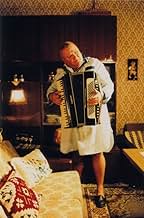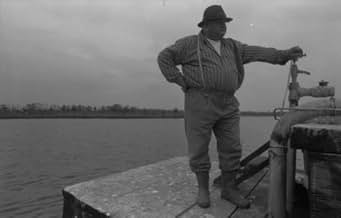VALUTAZIONE IMDb
7,0/10
3794
LA TUA VALUTAZIONE
Aggiungi una trama nella tua linguaSchultze is an accordion player and newly without work. When the local music club celebrates its 50th anniversary, his taste of music changes unexpectedly.Schultze is an accordion player and newly without work. When the local music club celebrates its 50th anniversary, his taste of music changes unexpectedly.Schultze is an accordion player and newly without work. When the local music club celebrates its 50th anniversary, his taste of music changes unexpectedly.
- Premi
- 11 vittorie e 6 candidature totali
Recensioni in evidenza
Calling this movie boring misses the point. Many people aren't used to really *watch* films, i.e. read the pictures. This films' pictures speak such a humourous and humanist language that dialogue is simply not needed. They tell you how important it is to live your dream - even if it's only the small dream of an elderly, not very handsome or clever man. Schultze is just not the type who speaks a lot - his story is worthy to be told nevertheless.
I laughed a lot seeing this, it also touched me. Great camera work, the film really trusts the power of pictures. To me it's the best German movie of 2004 so far (and I've seen "Gegen die Wand", which I liked very much).
I laughed a lot seeing this, it also touched me. Great camera work, the film really trusts the power of pictures. To me it's the best German movie of 2004 so far (and I've seen "Gegen die Wand", which I liked very much).
10sael-2
I saw this movie last night, and I was blown away. It is a very simple film, with stunning visuals, and ironic, understated, and appropriate dialog. Schultze, the main character, is a quiet, lonely, aging German man. Horst Krause played the part amazingly honestly. I never once felt like any of the characters were acting, especially Schultze. The writer and director, Michael Schorr, enables the viewer to feel Schultze's emotions and to care for him without ever really trying. It was almost as if I was seeing the world through Schultze's eyes, and feeling emotions through him, rather than being told what he was feeling, or being shown what he was seeing. This film is also a great comparison of American and German culture. It was interesting as an American to see my home portrayed from a German point of view, and I believe this film gives a uniquely appropriate portrayal of German life as well. This film is one of the best I have ever seen. It made me feel a range of emotions, it dazzled my ears with Zydeco music, and most of all, it made me truly care. I left the theater with an amazing feeling, like I had just had a experienced something truly special. I cannot believe this is Michael Schorr's first feature film. It was truly perfect.
This movie takes its time to develop. In more than one respect it reminded me of a Kaurismäki film. The landscape is depressing, the colors are not very bright, the shots are long and there is not much dialogue. And people seem only to come alive (whether it's in Germany or the US) when they're making music. There are moments of comedy but not many. Instead, you get to watch "everyday life" for a long time before something happens. And when it happens, it's not a dramatic turn or twist . . . It does not incite the characters to change completely . . . There is just a small change.
When you put all of this together, you get a very touching tale of humanity. A tale of friendship and loneliness. I think the characters are portrayed in a very life-like fashion (for example, when the loner Schultze travels to the US he is no more capable of socially connecting with people than he was in his hometown). You have to be patient with the story because there is no classic structure (exposition, story development, climax) . . . but I got really attached to the characters. There is a lot of loneliness in this film. But this is what makes it so attractive.
When you put all of this together, you get a very touching tale of humanity. A tale of friendship and loneliness. I think the characters are portrayed in a very life-like fashion (for example, when the loner Schultze travels to the US he is no more capable of socially connecting with people than he was in his hometown). You have to be patient with the story because there is no classic structure (exposition, story development, climax) . . . but I got really attached to the characters. There is a lot of loneliness in this film. But this is what makes it so attractive.
Schultze, a middle-age early retired German miner always had played polkas with his accordion. Even his father played polkas before him. Now he's retired and there's not much to do in his new boring life. Just eating alone, drinking beer with his friends and playing the accordion. But one night he listens to an exciting music on the radio: a cajun melody and he can not help to play it since that moment. He has found a new meaning to his new life. Comedy, drama, tenderness and a little music on this touching German movie. When I was watching it I couldn't get rid of the thought I was watching the real image of Peter Griffin, the main character of the cartoon series "A Family Guy". "Schultze Gets the Blues" has been awarded as the best movie in the 41th Gijón International Film Festival and its director, Michael Schorr was the best director as well. And I must say both of them were deserved.
First things first: You will need a lot of patience while watching "Schultze gets the blues". There are no dramatic scenes, no sensational turns or something that blows you out of your seat. Instead, the film develops slowly, working merely with pictures than with dialogues. And this is what it's all about: the boredom of retirement, the concealed longing for something new and the desperate hope of getting the "blues". Schultze, the main actor,tries to seek it by playing a tune he heard on the radio on his accordion, which leads him from Sachsen-Anhalt (in the former East Germany, DDR) to a music festival in Texas. This film is definitely worth watching, although it won't satisfy your desire for action or a surprising plot.
Lo sapevi?
- BlooperIn one of the dancing scenes, a crewmember runs across the screen as the camera follows the elderly dancing couples.
- Citazioni
Captain Kirk: [while hooking up Schultze's boat] I'm captain Kirk.
- ConnessioniReferences Star Trek (1966)
- Colonne sonoreLong Temps Passe
Written by Bruce Barnes
Performed by Sunpie and the Louisiana Sunspots
from the album "The Language of New Orleans, Vol. 5: Zydeco"
I più visti
Accedi per valutare e creare un elenco di titoli salvati per ottenere consigli personalizzati
- How long is Schultze Gets the Blues?Powered by Alexa
Dettagli
- Data di uscita
- Paese di origine
- Sito ufficiale
- Lingue
- Celebre anche come
- Schultze Gets the Blues
- Luoghi delle riprese
- Aziende produttrici
- Vedi altri crediti dell’azienda su IMDbPro
Botteghino
- Lordo Stati Uniti e Canada
- 595.071 USD
- Fine settimana di apertura Stati Uniti e Canada
- 14.074 USD
- 20 feb 2005
- Lordo in tutto il mondo
- 4.034.232 USD
- Tempo di esecuzione1 ora 54 minuti
- Mix di suoni
- Proporzioni
- 1.85 : 1
Contribuisci a questa pagina
Suggerisci una modifica o aggiungi i contenuti mancanti






















